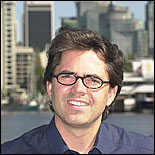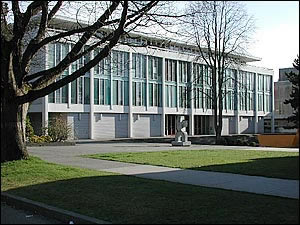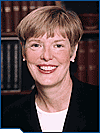Featured Non-Profit Interview:
Barney Ellis-Perry CFRE, BA Psychology
Interview by George Williams, Communications Specialist - Planned Legacy Inc.
 Strategic External Relations Officer, Land and Building Services
Strategic External Relations Officer, Land and Building Services
University of British Columbia (UBC)
About Barney Ellis-Perry: Barney Ellis-Perry is responsible for the development of relationships that will generate new financial resources to support the University of British Columbia (UBC) infrastructure. Before joining UBC, Barney was Director of Major Gifts at St. Paul's Hospital Foundation. He was also a founding partner in the successful fundraising company, the Malabar Group. Previously a fundraiser with the Canadian Diabetes Association, Barney also held two positions of a year each with two advertising firms, Simmons Advertising and Write Ideas. Barney currently teaches fundraising at the British Columbia Institute of Technology. He also volunteers on the Board of Volunteer Canada, the Whistler Freestyle Championship Organizing Committee and the Developmental Disabilities Foundation. Barney chairs the Board of Volunteer Vancouver.
Learn more about the University of British Columbia
Planned Legacy: Can you tell us about your background and what led you to pursue a career in development?
Barney Ellis-Perry: Like many people in the early 1990s, I  stumbled into fundraising and found I had discovered an occupation that was both professionally and personally fulfilling and incredibly fun and rewarding.
stumbled into fundraising and found I had discovered an occupation that was both professionally and personally fulfilling and incredibly fun and rewarding.
Coming from a family that placed a high value on volunteering, I was no stranger to the voluntary sector and I was fortunate that my personal characteristics and marketing background put me in good stead. I also enrolled in a night school certificate program in fundraising and learned valuable theory I could immediately put to good use.
Planned Legacy: What are your responsibilities as the Strategic External Relations Officer for the Department of Land and Building Services at UBC?
 |
|
Barney Ellis-Perry: I was hired to initiate a fundraising program for the infrastructure of UBC with a focus on deferred maintenance. Like most universities in North America, UBC underwent a massive building boom in the 1950s and 60s and we now have a legacy of buildings nearing the end of their planned life span. These buildings are in urgent need of major repairs and upgrades.
It was very unusual for the Physical Plant department of a university to hire a fundraiser to raise money for infrastructure. To my knowledge, UBC was the first university in North America to create such a position. I report directly to the Associate Vice President of Land and Building services.
I have designed a three-pronged fundraising plan that focuses firstly on engaging the other 50 plus fundraisers at UBC in raising money for infrastructure. Secondly I do direct fundraising for our infrastructure related projects and thirdly I facilitate public-private partnerships.
Planned Legacy: What are your major tasks on a daily basis?
Barney Ellis-Perry: Facilitating all of the above and getting people to think about the possibilities for making UBC Canada's finest university.
Planned Legacy: What do you find are the main differences between raising money to repair and upgrade existing infrastructure and raising money for new projects and initiatives?
Barney Ellis-Perry: The major difference is purely perception. We are not raising money to fix a ventilation system or paint walls. We are raising money to ensure our students have the best possible learning experience and to ensure that our faculty and staff have the environment they require to excel.
Planned Legacy: What are some of the challenges you face and how do you deal with those challenges? Are their any "best practices" that have worked especially well for you in your development initiatives?
Barney Ellis-Perry: I face a lot of pessimism and historically negative impressions of our department. Luckily I am naturally - unnaturally optimistic and able to see the big picture. I know that our department is run by some of the best and most innovative minds in the business. We need to communicate this to the campus community and to our contributors.
As far as best practices go, the UBC fundraising team is incredible and has a great depth of talent and experience. I am fortunate to receive extremely valuable input from my colleagues and supervisors.
Planned Legacy: Besides the obvious, what are the major differences between raising funds for a hospital, as you did in your previous position, and raising funds for a university?
Barney Ellis-Perry: Well, we are not saving lives here, but we are providing the intellectual capital for the country and this is what is helping Canada lead the G7 nations in economic growth and stability.
A hospital doesn't have the inherent alumni support that a university does. The strength of the alumni's feelings for their alma mater is very underestimated and thus under-leveraged in Canada, especially in Western Canada.
Planned Legacy: You are part of a very large development department at UBC. How do you all work together to produce results?
Barney Ellis-Perry: We have more than 50 fundraisers and numerous support staff but it does feel like a team. Much of this is due to the values of our leader Clark Warren, who lives and breaths relationship-based fundraising as a core value and who really commands our respect. Clark has also surrounded himself with some very bright minds who are willing to take risks and push the envelope.
There is a strong realization of the need to have a coordinated approach to our fundraising and thus we have an excellent prospect management system that is used to really keep us all on track. The penalties for not being a team player when it comes to prospect coordination are fair but strong!
Planned Legacy: Does each different department at UBC undertake their own development initiatives or does a central development office guide them?
Barney Ellis-Perry: We have an integrated multi-level approach with a central office that acts as a resource center supporting the activities of the faculty fundraising units.
Planned Legacy: What are the major reasons for the success of the UBC giving programs?
 Barney Ellis-Perry: Under the direction of Dr. Martha Piper, UBC has an extremely clear mission called Trek 2000 and this mission has mobilized UBC to become the number two medical doctoral university in Canada. UBC is attracting a huge amount of new research money and stellar faculty members, so it is an exciting place to put your money. Our donors recognize that.
Barney Ellis-Perry: Under the direction of Dr. Martha Piper, UBC has an extremely clear mission called Trek 2000 and this mission has mobilized UBC to become the number two medical doctoral university in Canada. UBC is attracting a huge amount of new research money and stellar faculty members, so it is an exciting place to put your money. Our donors recognize that.
Planned Legacy: What does UBC do to create and maintain donor relationships? Are there any specific techniques that have worked especially well for you?
Barney Ellis-Perry: Like many large institutions this has historically been a challenge and one that we are actively addressing - in fact a new stewardship department has just been set up. Probably our strongest area for stewardship has been in gift and estate planning, where very personal relationships with donors have been maintained.
Planned Legacy: What does UBC do to recognize its donors? Are there any specific
programs that have worked especially well for you?
Barney Ellis-Perry: Most of our current recognition is pretty standard but this is changing. We are pretty good at recognizing major donors and our president makes them feel incredibly special and they love her.
Planned Legacy: How does UBC create community awareness for its initiatives and
development programs?
Barney Ellis-Perry: We have an excellent public affairs office that generates an enormous amount of press everyday so our donors and prospects are very aware of UBC. Donors like to support the winning team and UBC is very well perceived in the local, national and international community. So, for fundraisers who are really cleaning up after the parade, our job is a lot easier. I believe that an organization's mission must first have a powerful impact in the community before any fundraising can occur and our mission does.

Planned Legacy: How does UBC keep its alumni involved and interested in its development programs?
Barney Ellis-Perry: We have lots of work to do in this area but many faculties do an excellent job in alumni relations and integrate that with their departmental development program.
Planned Legacy: Are there any other development programs or techniques that have worked exceptionally well for UBC?
Barney Ellis-Perry: The engagement of our President, Martha Piper, who is a tireless fundraiser and who has an incredible fundraising team supporting her, is probably our greatest weapon.
Planned Legacy: When you teach fundraising at BCIT and Vancouver Community College, what are the key points you try to get across to your students?
Barney Ellis-Perry: My main message is that being allowed to be a fundraiser is truly a gift because our job is to facilitate people acting on their values in support of an organization's mission. I believe this is something we need to honor and celebrate about our profession more.
I also express what is probably a dissenting opinion - that fundraising is an art not a science. I believe there are a lot of people who are trying to bottle the magic and make it a clinical exercise. It is important to have core competencies established, but let's not focus so much on building mathematical formulas around what we do.
Planned Legacy: What role do you see new technologies such as the Internet, Web sites, e-mail, electronic newsletters and Web-based kiosks playing in the future of philanthropy?
Barney Ellis-Perry: The Web is both a huge challenge and a huge opportunity and one that very few organizations utilize effectively, but I believe we can create a new level of intimacy and communication with donors via the Web that will enable many organizations to excel. The Web also levels the playing field between the big behemoth organizations and the small frisky ones. I like that.
Planned Legacy: What can non-profit organizations learn from for-profit companies and vice versa, with regards to raising funds, generating income, marketing etc?
Barney Ellis-Perry: The notion of social entrepreneurism is a new and trendy term but basically it is saying let's recognize the core competencies of an entrepreneur - willingness to take risks, creative thinking and communication - and apply those competencies in all sectors, to get non-profits to think outside the box in support of a civil society.
The whole notion of "non-profit" is dumb, we want to profit just as much as Wal Mart. We just want to do so to make the world a better place.
We need to breakdown the barriers that exist between sectors and realize at the end of the day there is only one world and we all have to live here and we all need to contribute as best we can to make it a better place.
This may sound naive but at the end of the day it is in everybody's best interest to contribute to making our community the best place it can be - everyone, in all sectors, can benefit from a healthy and sustainable community.
 Planned Legacy: In the future, what changes do think we will see regarding methods of fundraising and development?
Planned Legacy: In the future, what changes do think we will see regarding methods of fundraising and development?
Barney Ellis-Perry: I am hoping we will see less "noise" in fundraising and more focus on relationship-based mission-centered development. I sound negative but I think there will be a falling out in the "market" in Canada as Government support continues to erode, the boomers really start to give significantly and donors start to ask hard questions of the organizations they choose to support. Market forces will hopefully squeeze out those irrelevant organizations that are not delivering on a passionate mission in a collaborative and cost effective manner.
I for one am still waiting to be approached by someone who has taken the time to understand my (and my partner's) real passions and values and ask us to support them in a meaningful way. I don't want to get any more junk fundraising mail addressed to Mrs. Bunnie Alice-Parry - enough said.
About the University of British Columbia
 Only 30 minutes from the heart of downtown Vancouver, the University of British Columbia holds an international reputation for excellence in advanced research and learning. UBC has more than 130,000 alumni who form an extensive array of connections in over 120 countries around the world.
Only 30 minutes from the heart of downtown Vancouver, the University of British Columbia holds an international reputation for excellence in advanced research and learning. UBC has more than 130,000 alumni who form an extensive array of connections in over 120 countries around the world.
UBC grads can stay in touch with their alma mater through various events organized by the UBC Alumni Association, by keeping up with the latest in UBC's Trek Magazine, or just by clicking on to the Alumni On-Line Community Web site.
The spectacular UBC campus is a 'must-see' for any visitor to Vancouver, British Columbia — where snow-capped mountains meet ocean, and breathtaking vistas greet you around every corner. UBC boasts some of the city's best attractions and recreation facilities, including the Museum of Anthropology, the Chan Centre for the Performing Arts, the UBC Botanical Garden, and endless opportunities to explore forested trails in the adjoining 763-hectare Pacific Spirit Regional Park.
For more information please contact:
Barney Ellis-Perry
Strategic External Relations Officer, Land and Building Services
University of British Columbia
2329 West Mall, Vancouver, B.C. V6T 1Z4
Phone: (604) 822-1922
Fax: (604) 822-6969
E-Mail: [email protected]
Web: http://www.lbs.ubc.ca/
Would you like to be featured in our Community Ties Nonprofit Newsletter?
Do you have a story to tell that would offer valuable insights to our subscribers?
If you are a nonprofit development professional and would like to be interviewed for our Community Ties Nonprofit Newsletter, or if you have an interesting story that relates to donor recognition, donor walls, donor relations, stewardship, interactive technologies, nonprofit marketing or related nonprofit areas, that you think would be of interest to our readers, please e-mail us at [email protected].
We look forward to hearing from you!

